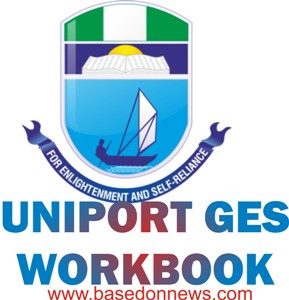UNIPORT GES 103 – Answers to GES 103 – Nigerian Peoples and Culture Workbook Part II

Uniport GES 103 – This post is majorly for all the students that want to fill UNIPORT GES 103 – Nigerian Peoples and Culture Workbook. This article will help you to confirm the answers you wish to select or you’ve selected. Also, guidelines on how you will write your GES 103 exams and possible questions you will see are also stated. GES 103 has been initiated as a compulsory course by NUC to all departments in the University of Port Harcourt and even to other schools at large. It is a course where you are been taught Nigerian Culture. This is where students who may not major in Sociology are opportune to have knowledge of it. It is indeed a cultural heritage. Uniport does not play with GES courses as it is very compulsory that all students must pass it before graduating from the University.
Many have failed the course just because they were not informed or they were not updated with the right information. Always visit the site, www.basedonnews.com to get updates and similar questions that would come out in your exam. We have been doing it; that is helping students with the right information. We still believe we can.
As we promise to always keep you updated with tips on how to be successful in your academics, latest scholarships, assignments, current questions, and questions you are likely to see in your exams. To be always updated with recent information and get it directly to your phone, kindly subscribe to us using your Email address. Subscription is totally free. You can also Like our Facebook Page to always get updates in your phone via social media.
FOR GES 103 PART I – CLICK HERE
The GES 103 part II is typically done to assist students in answering the questions from Unit Three to Unit Five. If you’ve answered yours and want to confirm if what you’ve done is correct, you can easily check the answers below. If you’ve not answered any, you can still use this as a guideline to answer yours. But in all, we advise you read the Textbook so that you can confirm the answers provided.
UNIT THREE
- Family is the social context into which members of a society derive their primary identity. It is the most basic institution in any society
- Kinship connotes the whole network of relationships based on birth and descent between parents and children, between siblings, individuals and their wider kin such as parents’ siblings, grandparents
- A third family unit is the single-parent family in which children live with an unmarried, divorced or widowed mother or father
- Polygamous family is a form of marriage in which a person has more than one wife
- (i) NEEDS – National Economic Empowerment and Development Strategy – is a measure for economic growth and development
(ii) SMES – Small and Medium Enterprises – is a form of solution for real diversification of national economy by growing the local content
(iii) MDGS – Millenium Development Goals – is an economic programme and plan for growth and development by the Federal government
(iv) GDP – Gross Domestic Product – The current economic analysis of the country’s economic growth based on the indices of income generation
(v) OFN – Opportunity Finance Network – invests in opportunities that benefit low-income, low-wealth and other disinfested communities in the world
- The four major problems of the Nigerian Economy
- Corruption
- Poor institution and infrastructure
- Over-dependence on oil
- Unemployment and insecurity
CLICK HERE TO SEE AVAILABLE SCHOLARSHIPS TO REGISTER
- Monogamous marriage is a marriage between one man and a woman
- Levirate marriage is a marriage where the deceased’s wife is been taking to marriage by the deceased’s brother
- Sororate marriage is a marriage where a man marries the sister of his deceased wife
- Ghost marriage is the situation where a man can marry in the name of a deceased brother
UNIT FOUR
- States affected by Drought include; Katsina, Sokoto, Borno, Kano and Bauchi
- Nigeria shares lake chad with republic of Chad and Niger Republic
- The principal rivers of Niger and Benue converge in Lokoja and it is also called the Confluence Town
- (a) Answer is D – none of the above
- Answer is D – North
- (a) Answer is True
(b) Answer is C – Global warming
- Land pollution in Nigeria is as a result of Bunkering, drilling or oil exploration that are typically characterized by spills, use of chemicals for agricultural purpose and improper waste disposals
- The environment constitutes of the air, soil, water, all living and non-living things as well as multiple resources found around us
UNIT FIVE
- Afan festival is celebrated by Kagoro people of Southern Kaduna
- WTTC stands for World Travel and Tourism Council
- Festival is a season marked with a programme of celebration and special celebration which are found on mythical and spiritual beliefs.
- The major occupation of Ijaw people is Fishing
- Ikwerre Ethnic nationality celebrates New Yam festival called eri-Iji-Ikneh
- Abuja carnival was initiated in 2005
- Durbar parade is used to showcase horsemanship, preparedness for war and loyalty to the state
- Social integrity refers to principles by which individuals or actors are related to one another in the society
- Social mobility refers to the movement of individuals and groups between different socio-economic positions
- Open system of stratification refers the position of each individual as influenced by the person’s achieved status
- Closed system of stratification is a system that allows little or no possibility of moving up
- An example of a closed system in Nigeria is the slave and the caste systems of social inequality which do not encourage mobility
- The criminal justice system of Nigeria is made up of the police, the courts, the corrections
- Five perspectives in understanding the concept of crime
The legalist perspective
The political perspective
The psychological perspective
The sociological perspective
15. Ten types of crimes prevalent in Nigeria
- Bribery and corruption
- Rape
- Money laundering
- Vandalism
- Burglary
- Cybercrime
- Embezzlement
- Child abuse
- Copyright infringement
- Forgery
- Explaining the following acrospires:
- AIDS: Acquired Immune Deficiency Syndrome – It reduces or makes the body immunity inactive or deficient and thus exposes the patient to opportunistic diseases that may lead to death
- EVD: Ebola Virus Disease – It is an infectious and generally fatal disease marked by fever and severe bleeding, spread through contact with infected body fluids by a filovirus whose normal host specie is unknown.
- HIV: Human Immunodeficiency Virus – It is a tiny germ or virus which destroys the human body due to lack of body immunity or its deficiency for body defence.
- HCDS: Health Care Delivery System – These are formal and non-formal activities which help in the provision of health services for a population
- WHO: World Health Organisation – sees indigenous or traditional medicine as health produces, approaches, knowledge and beliefs incorporating and exercises singularly or in combination to treat, diagnose and prevent illness or maintain well being.
If what we are doing is really Okay by you, please comment below.
TO GET THE REMAINING PART OF THE GES WORKBOOK, CLICK HERE
For possible questions you will see in your Exam Call: 07053219593 or Comment Below stating your Email address and Phone number.
We advise you read the Textbook as Exam questions will come out from the Textbook as well as the workbook.
Are you having any challenge in any course?
Do you have any question that is bothering you?
Are you in need of scholarship for financial release?
Kindly comment below for assistance.
Also communicate WITH US if there is any problem.

I didn’t see logic and philosophy
Is there just search for logic and philosophy by Basedonnews.com
What are the possible GES 103 exam questions? Please.
Click here to access it
I didn’t see ges 103 unit 6 answers
coming soon
This is really nice, keep it up thanks!! But what about the Unit6 answers..
OK thanks
Nice, work you’re doing great
Please is there no history and philosophy of science? GES 104
yes